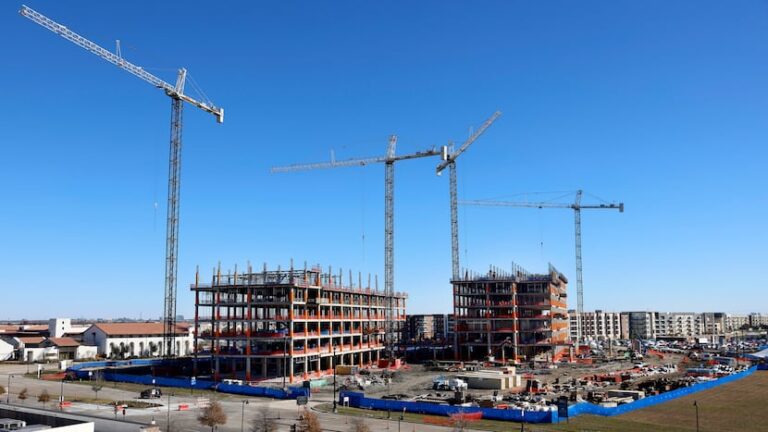This year has been a big one for Big D's Big Finance.
Three big Wall Street banks have expanded into new campuses in Dallas this year, solidifying their bets on the fastest-growing metro in one of the fastest-growing states. Due to the rapid expansion of the financial industry in Texas since the start of the pandemic, the region now has more financial workers than Chicago or Los Angeles, trailing only New York.
And it's not just big banks.
Asset managers of all sizes are trying to cash in on the influx of wealth and people pouring into Dallas from the coast in search of cheaper housing and state income tax exemptions. Fisher Investments moved to Plano from Washington state earlier this year, joining asset managers such as Charles Schwab and Canyon Partners that moved in several years ago.
“The smart money is in Dallas now,” Mayor Eric Johnson said in October at a groundbreaking ceremony for Goldman Sachs Group Inc.'s 5,000-person campus in the trendy Victory Park neighborhood near downtown.
The expansion of banks has helped solidify the city's status as the financial mecca of the South, overshadowing rival cities such as Atlanta and Miami. The rapid migration of people and businesses to Texas has created a virtuous cycle of job creation in construction, restaurants, and other industries not directly connected to banks.
However, financial professionals in Dallas tend to be paid much less than financial professionals in New York for similar jobs. For example, the average annual salary in Dallas for a financial analyst or investment analyst is $102,000, which is nearly 30% lower than the current rate in New York.
Average salaries are also lower depending on the type of work. In Texas, the majority of our workforce consists of back-office jobs such as engineering, customer service, and loan processing.
There are concerns that state politics will slow the industry's boom.
Attorney General Ken Paxton's office said in October that 10 financial companies, including Bank of America and JPMorgan Chase & Co., had violated a Republican-backed law that punishes companies that restrict business with the oil and gas industry. He announced that he is considering whether there is any such possibility. Concerns about climate change. Authorities are also investigating financial companies over a 2021 law that restricts public contracts for companies that “discriminate” against gun manufacturers.
JPMorgan CEO Jamie Dimon said in a November interview with Bloomberg News that the law risks damaging the state's business-friendly reputation. Paxton said the concerns are overblown and all companies need to do to avoid this problem is distance themselves from politics.
So far, there are no signs of slowing down in Dallas' financial sector.
Wells Fargo & Co.'s new $500 million, 3,000-employee campus will be built in Irving. Last month, Bank of America held a groundbreaking ceremony for a 30-story high-rise building less than a mile from Goldman's new campus.
Dallas-Fort Worth, currently the nation's fourth-largest metro, has surpassed Chicago and Los Angeles as the No. 2 city for financial jobs during the pandemic. According to data from the Bureau of Labor Statistics, there are more than 380,000 people working in this industry.
That compares to 323,000 in Chicago, home to CME Group, Cboe and other derivatives companies that form the backbone of the city's financial industry. New York remains number one, with 809,000 jobs in the sector.
Financial firms occupy 28 million square feet of office space in the Dallas area, second only to New York, according to Cushman & Wakefield. Combined with the insurance industry, this sector accounts for 12% of all commercial real estate space in Dallas, according to CoStar data.
Jennifer Chandler, market president for Bank of America in Dallas, said Dallas benefits from being located in the middle of the country and having two airports with many nonstop flights. . The company has about 14,000 employees in the Dallas area, more than half of whom work in engineering and operations, Chandler said.
“We love the central location,” Chandler said. “It’s very accessible and the quality of life is high.”
Banks like JPMorgan, Wells Fargo and Bank of America have long had a presence in Texas, but the pandemic accelerated their growth.
Atalaya Capital Management, a $10 billion alternative investment advisory firm, has opened an office in Dallas in 2022, making it its only location outside of its New York headquarters. Charles Schwab will move from San Francisco to Westlake in 2021, Fisher Investments is from Camas, Wash., and Canyon Partners, a $24 billion fund based in Los Angeles, will open an office in Dallas in 2021. Established. Dallas last year.
Frisco, New York-based TIAA will occupy a new 15-story, more than 500,000-square-foot office tower in the Frisco development's Dallas Cowboys Star. The state provided an $18 million Texas Enterprise Fund grant for the project, which will house 2,000 TIAA employees.
“With the coronavirus, everyone has come to understand what can be done remotely,” said Atalaya founder Ivan Zin. “Especially in Dallas, we're seeing a broadening of the talent pool as asset management and hedge funds grow.”
Dallas finance executives say the area is chock-full of engineering and technology workers, which is one reason they've located so many back-office jobs there.
More executive and investment banking positions are expected to be located in Texas in the coming years.
Already, executives such as Charles Schwab vice president Rick Wurster and Fortress Investment co-CEOs Joshua Pack and Drew McKnight have moved to North Texas.
Dallas-based Texas Capital Bank has expanded over the past few years by adding an investment banking division. The company launched its first Texas-focused exchange-traded fund in July.
JPMorgan has 15 investment bankers based in Dallas, a number that has more than doubled in just a few years.
“Currently, our internal and various business unit CEOs are based in Dallas, Plano and Fort Worth, working with employees around the world,” said Elaine Agarther, president of JPMorgan's Dallas region. said. “Before, a lot of it was concentrated in New York.”
Shelley Hagan and Catalina Saraiva, Bloomberg

